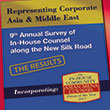 ASIAN-MENA COUNSEL is pleased to present the results of its ninth annual Representing Corporate Asia and Middle East Survey of members of our In-House Community of corporate legal and compliance counsel, and buyers of legal services along the New Silk Road. Jump to: |
SURVEY METHODOLOGY
This year’s survey, handed to over 21,000 of Asia’s in-house counsel across 12 jurisdictions, was administered both online and at our 18 annual In-House Community Congress and Symposium events. Participants were vetted for suitablity, but their responses were included on a completely anonymous basis.
The survey contains questions (multiple choice where appropriate) that gather the views of the in-house communities of each jurisdiction with regard to their opinions and concerns. Thoughts from China, Hong Kong, India, Indonesia, Japan, Malaysia, the Philippines, Singapore, South Korea, Thailand, the UAE and Vietnam have been collected and collated in order to find the trends in each region.
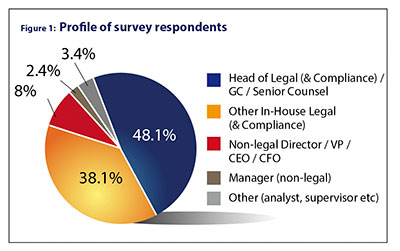 Profile of participents Of the In-House Community members responding to the survey, just shy of half (48.1 percent) were Heads of Legal (& Compliance)/GC/Senior Counsel. 38.1 percent were ‘Other’ In-House Legal (& Compliance), eight percent put themselves down as Non-legal Director/VP/CEO/CFO, 2.4 percent were managers and the remaining 3.4 percent worked in other areas of the company. (Figure 1) The most-represented industry classification in this year’s survey of the community is Financial Services, worked in by 16.7 percent of participants. Manufacturing saw the second-highest amount of representatives at 14.9 percent, while Technology, Media and Telecommunications had slightly less with 13.9 percent. Meanwhile, 10.4 percent of respondents classified themselves as working in Energy/Natural Resources, placing it fourth. (Figure 2) |

|
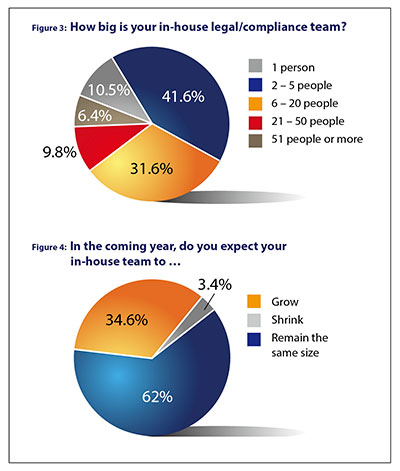 Respondents primarily belonged to in-house teams of either two-to-five members or six-to-20, with 41.6 percent and 31.6 percent respectively working in groups of that size across the region. 10.5 percent of the participants work alone, 9.8 percent in groups of between 21 and 50 and the rest of those asked (6.4 percent) are in teams of 51 or more. (Figure 3) The predominant assumption is that teams will remain the same size over the coming year, thought by 62 percent of those surveyed. Of the remaining, 34.6 percent expected their teams to grow and just 3.4 percent anticipated their teams getting smaller. Though this seems optimistic, last year’s survey had even fewer (1.9 percent) saying they expected their teams to shrink, as well as 43.6 percent expecting in-house team expansion, suggesting that growing the in-house team may be becoming less popular, in some cases in favour of seeking external help from traditional or alternative legal service providers. (Figure 4) Recruitment |

|
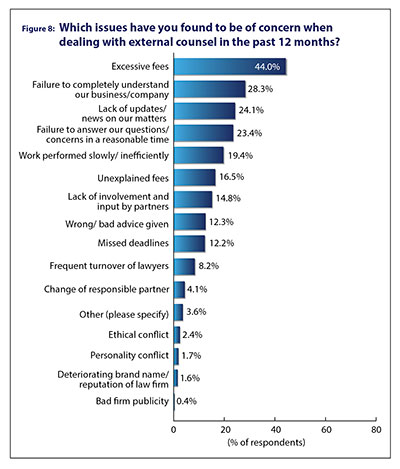 REGIONAL & COMMON IN-HOUSE CONCERNS Each of the jurisdictions and sectors covered has its own issues and concerns (dealt with jurisdiction-by-jurisdiction over the following pages), but the region’s In-House Community does share a multitude of common challenges. From a regulatory perspective, Anti-Money Laundering legislation, Data Privacy laws and the US Foreign Account Tax Compliance Act (FATCA) were mentioned by many across the region. For those with cross-border responsibilities, dealing with “ambiguous regulations” especially, but not necessarily, in developing markets, complicated by “unpredictable enforcement” is an everyday issue. For counsel based in or covering the relevant jurisdictions, the impact of the forthcoming ASEAN (Association of Southeast Asian Nations) economic integration was on the minds of many earlier this year, though recent economic developments may have moved the focus of some. A growing number of counsel also cited cyber-security across the region as an area they needed to pay attention to. As ever, “Maintaining regulatory compliance with insufficient headcount” and “Keeping up-to-date with legal developments and continuing our professional development” are among the ever-present demands for lawyers wherever they are, and, as one senior counsel in Indonesia put it: “The challenge for in-house counsel will always be how to accommodate business needs in a legally-compliant manner”. In the words of a Malaysia-based counsel, the constant role of in-house lawyers was “to educate the business people of the legal and regulatory requirements impacting the business, and implement risk control effectively”. Others though, see the in-house role as encompassing more than just advising on the law, as in the words of one Singapore based GC: “Legal counsel need to be commercially savvy and not behave like lawyers all the time. Business leaders want legal counsel to be business enablers and leaders in their own right, rather than [just] lawyers”: not a view shared by all. Working with external counsel Expertise in a specific area is, by a long way, the most important factor when the community chooses external counsel, with 71.9 percent saying it is a must. Other key considerations include fees (47.5 percent), responsiveness (43.7 percent) and reputation of a law firm (37.6 percent). Reputation of an individual lawyer, too, crosses the minds of many when shopping for legal services, as 24.7 percent contemplate this. (Figure 7) When dealing with external counsel over the past 12 months, excessive fees have been the number one concern, with 44 percent of respondents ticking that box. Some have also experienced law firms failing to completely understand their business (28.3 percent) and a lack of updates (24.1 percent). Timing has been an issue for almost as many (23.4 percent), with many law firms seemingly dragging their feet. (Figure 8) |
| In-House Community Issue and concerns by Jurisdiction Click to jump to: CHINA HONG KONG INDIA INDONESIA JAPAN <a href="https://dev.inhousecommunity.com/anullrticle.php?id=I0CEWM1-VUNNBMX-XTTFPVD-OOW9ILG” >MALAYSIA |
x x PHILIPPINES SINGAPORE SOUTH KOREA THAILAND UNITED ARAB EMIRATES VIETNAM |
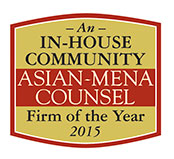 Firms of the Year The Representing Corporate Asia & Middle East Survey 2015 also provided in-house counsel with an opportunity to recognise the law firms which have made a significant impression on them in the past year. Based on the votes and testimonials from hundreds of in-house lawyers from across the region, our Firms of the Year 2015 is not intended to be an inventory of the largest or most active firms practising in Asia Pacific and the Middle East, but rather a genuine representation of the firms which have made the most positive impression on their clients for a range of reasons, whether it be because of a firm’s expertise or responsiveness, its reputation, or perhaps the flexibility it shows its clients. Where appropriate, both a ‘local firm’ (i.e. a firm which originated in that jurisdiction) and an ‘international firm’ have been honoured. Honourable Mentions have also been awarded to the many firms who received a high number of votes and strong recommendations in certain practice areas. Click Here for a full rundown of this year’s winners. |

